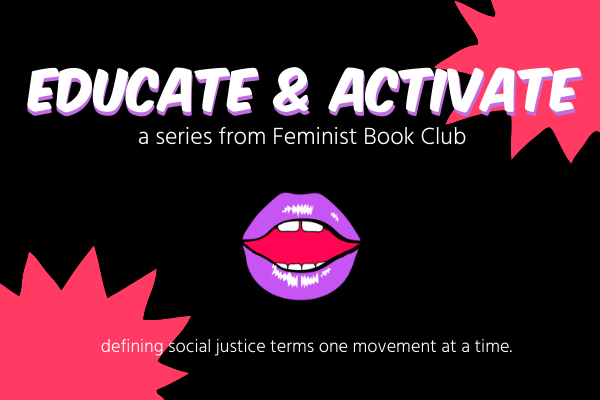Introduction:
Feminist Book Club blog contributors are working together to create posts as an “Educate & Activate” series. We will define a term or movement, provide historical context, and give you additional resources to learn more. We believe that an educated populace can be better activists, accomplices and co-conspirators. It is important to note that these are meant to be brief descriptions and not inclusive or exhaustive of all resources. We urge you to continue being curious, and continue learning more.
Definition
What is Ecofeminism? Ecofeminism or ecological feminism examines the relationship between women and nature. Ecofeminism can be defined as, “a philosophical and political movement that combines ecological concerns with feminist ones, regarding both as resulting from male domination of society.”
First usage
The French feminist, Françoise d’Eaubonne, created the term, ecofeminism, in her 1974 book, Le Féminisme ou la Mort (Feminism or Death).
Historical context
Ecofeminism focuses how patriarchy mistreats both nature and women. Ecofeminists examine gender categories to show how social norms dominate women and nature. They advocate “an alternative worldview that values the earth as sacred, recognizes humanity’s dependency on the natural world, and embraces all life as valuable.”
An alliance of professional and academic women held a series of conferences and workshops in the late 1970s and early 1980s in the US to discuss ways in which feminism and environmentalism can be combined, resulting in the modern ecofeminist movement. Ecofeminists noted how women and nature were portrayed as “chaotic, irrational, and in need of control” in contrast to men shown as “rational, ordered, and thus capable of directing the use and development of women and nature.” This caused a hierarchy where men dominated and exploited both women and nature.
By the late 1980s, ecofeminism became a popular movement, mainly because of Ynestra King’s 1987 article, “What is Ecofeminism?” published in The Nation. This article forced Americans to think of the ways in which they exploited nature and oppressed women.
There are two kinds of ecofeminism- radical and cultural. Radical ecofeminism asserts that, studies the “ways in which both women and nature have been associated with negative or commodifiable attributes while men have been seen as capable of establishing order. That division of characteristics encourages the exploitation of women and nature for cheap labour and resources”. On the other hand, cultural ecofeminists argue that, “women have a more intimate relationship with nature because of their gender roles (e.g., family nurturer and provider of food) and their biology (e.g., menstruation, pregnancy, and lactation).” Cultural ecofeminism is also rooted in “nature-based religions and goddess and nature worship as a way of redeeming both the spirituality of nature and women’s instrumental role in that spirituality.”
Ecofeminism has been criticized for exploiting labor from developing countries and appropriating indigenous culture and religions. Consequently, contemporary ecofeminism must recognize the effects of class, race, ethnicity, and sexuality on the social position of women.
Resources for Further Education:
Braiding Sweetgrass by Robin Wall Kimmerer
Ecofeminism: Feminist Intersections with Other Animals and the Earth edited by Carol J. Adams and Lori Gruen
The Edible Woman by Margaret Atwood
Oryx and Crake by Margaret Atwood (MaddAddam Trilogy)
Parable of the Sower by Octavia Butler (Earthseed dulogy)
Sister Species: Women, Animals, and Social Justice edited by Lisa Kemmerer
Sula by Toni Morrison
Sassafrass, Cypress, and Indigo by Ntozake Shange
Earth Democracy: Justice, Sustainability, and Peace by Vandana Shiva
The Temple of My Familiar by Alice Walker
Ecofeminist Philosophy: A Western Perspective on What It Is and Why It Matters by Karen J. Warren
Ecology of Feminism and the Feminism of Ecology by Ynestra King
Podcast episode on patriarchy and climate change by Switch
Podcast episode on ecofeminism on Gang of Witches
Podcast episode on ecofeminism on Stuff Mom Never Told You


![This April we're diving into Muslim voices with some pretty incredible titles✨️
This members will also receive a sticker from @marhabaprints! Marhaba Prints is a South Asian and Islamic inspired online stationary store selling greeting cards, notepads, stickers, and more, that aims to be a bridge between Pakistani heritage, Islamic teachings, and Canadian culture.
As always we'll be discussing these titles in our online community! Join by April 9th to get one of these titles in your mailbox!
Learn more by heading to the link in our bio!
[alt text: three slides showcasing six books including: Hijab Butch Blue by Lamya H, All My Rage by Sabaa Tahir, Read Dangerously by Azar Nafisi, Read This to Get Smarter by Blair Imani, We Hunt the Flame by Hafsah Faizal, and You Exist Too Much by Zaina Arafat.]](https://www.feministbookclub.com/wp-content/plugins/instagram-feed/img/placeholder.png)
Pingback: 3 Environmental Activists You Should Know | Feminist Book Club